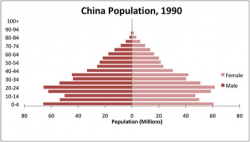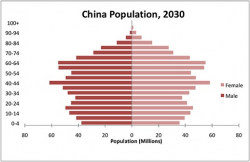 Total reliance on anything is generally to be avoided, but relying on something that shows signs of vanishing comes either from a misunderstanding of the present, or an ignorance of possible future scenarios.
Total reliance on anything is generally to be avoided, but relying on something that shows signs of vanishing comes either from a misunderstanding of the present, or an ignorance of possible future scenarios.
Long-term reliance has a slow, grinding positive feedback loop that in time can become a dependency, and actually preclude the vision necessary to see other alternatives.
 We know that the momentum of high-speed travel makes it hard to change direction, or even to see clearly where you are going. In the same fashion China’s high-growth economic trajectory, and low-cost labor model, may fit the bill for a blind-spot when it comes to the future. This is not the least of China’s many Black Swans, but it is a big game-changer.
We know that the momentum of high-speed travel makes it hard to change direction, or even to see clearly where you are going. In the same fashion China’s high-growth economic trajectory, and low-cost labor model, may fit the bill for a blind-spot when it comes to the future. This is not the least of China’s many Black Swans, but it is a big game-changer.
The source of the reliance is the well over 100 million people who make up China’s production line workforce. Clearly, it is impossible for anyone to summarize the lives of these hard-working people, but the commonalities are there, and could be worth exploring.
Let’s call our representative Ms. Qiu. She is a 39-year old woman from the Sichuan province who, at the age of 19, was more than happy to leave her village and move up to the “Big Smoke.” She dreamed that she would make money, find a husband, learn some useful skills, and live a bigger life. At the very least the city would offer her something to do, which was not true, and is not true, of her home town.
Ms. Qiu was not a spoiled, fickle individual, and she could endure privations that many of us would consider very harsh. Like most women in this scenario she succeeded in her own terms and, after 20 years, she is married with a child.
Her daughter, Bing Bing, lives in Sichuan with her grandmother and grandfather, and goes to school every day with the expectation of six people on her shoulders (4-2-1). Bing Bing is very likely to succeed academically and will not want to work in a factory. Mom and Dad are doing everything they can to make sure her life is even bigger than theirs.
For Bing Bing’s mother and father, it has been 20 years of hard work in the textile and electronics industry. Mom got to be a Production Cell Leader, and Dad got to learn about plastic injection component tooling, and has been re-classified as a skilled worker.
It is true that the brilliance of their dreams waned as they grew older, and eventually melded, not clashed, with reality of their lives. This has been easy enough to accept because, apart from a few setbacks, things have improved steadily. Ms. Qiu, or Mrs. Li as she is now called, did find her beau in the city, and she did have a child, one that is actually going to complete high school.
This was a first for her family, and it makes her proud.
Mr. Li was lucky to get into a company-sponsored training program and is set to become a qualified tool maker. His family sees him as a very solid, reliable provider, and in the future he will be in the position to offer an employer a skill-set, rather than accept whatever manual work he can get. The biggest issue for him is that he can make his own future, something that his own father could not even have dreamed about doing.
Mr. and Mrs. Li are not big on strikes and they don’t want to rock the boat. They understand the higher expectations of the younger generation from an intellectual point of view, but not emotionally. They don’t feel it. These kids coming up seem too assertive and a little too spoiled for their own good, but at the same time they are not sufficiently arrogant to imagine that everything they went through should be repeated in an indefinite loop. Mr. Li has made a decision to try to ease tensions but it’s hard to hold back motivated young people when they have made a decision to do something.
Fly in the Ointment
But just when you thought things had come to a hard-fought, manageable stasis, with a predictable increase in salaries, and a definite increase in conflict in the workplace, the flow of nice, hard-working Sichuan youth is grinding to a halt. That decline itself is accelerating and the resulting change will be fast, demographically speaking.
The next generation of Ms. Qiu’s and young Master Li’s are not entering the workforce as expected because they were simply never born. For the few who are coming onstream, many will not follow the same path as their parents, as amply illustrated by the Li’s success in getting Bing Bing through school.
Unskilled workers are effectively vanishing from the workforce. The new generation is slowly switching to the professional workforce but many are falling into a black hole when they graduate because the economy cannot use their skills yet (hyperbole alert).
The lack of a transition generation, through qualified skilled labor, is the problem that has yet to be seriously addressed. This is still a big surprise to me. China’s government may come across as technocratic but the Chinese culture is Confucian, and the emphasis there is on everyone becoming a “scholar.” This has contributed to an economic model that will be hard to transition.
Not impossible, just hard.
(Tip ‘O the Hat to Going Native)